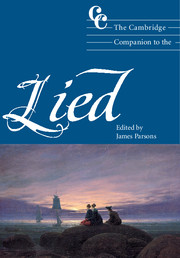Book contents
- Frontmatter
- Part I Introducing a genre
- Part II The birth and early history of a genre in the Age of Enlightenment
- Part III The nineteenth century: issues of style and development
- 4 The Lieder of Schubert
- 5 The early nineteenth-century song cycle
- 6 Schumann: reconfiguring the Lied
- 7 A multitude of voices: the Lied at mid century
- 8 The Lieder of Liszt
- 9 The Lieder of Brahms
- 10 Tradition and innovation: the Lieder of Hugo Wolf
- 11 Beyond song: instrumental transformations and adaptations of the Lied from Schubert to Mahler
- Part IV Into the twentieth century
- Part V Reception and performance
- Index
8 - The Lieder of Liszt
from Part III - The nineteenth century: issues of style and development
Published online by Cambridge University Press: 28 September 2011
- Frontmatter
- Part I Introducing a genre
- Part II The birth and early history of a genre in the Age of Enlightenment
- Part III The nineteenth century: issues of style and development
- 4 The Lieder of Schubert
- 5 The early nineteenth-century song cycle
- 6 Schumann: reconfiguring the Lied
- 7 A multitude of voices: the Lied at mid century
- 8 The Lieder of Liszt
- 9 The Lieder of Brahms
- 10 Tradition and innovation: the Lieder of Hugo Wolf
- 11 Beyond song: instrumental transformations and adaptations of the Lied from Schubert to Mahler
- Part IV Into the twentieth century
- Part V Reception and performance
- Index
Summary
Although the name Franz Liszt (1811–86) is associated mainly with keyboard and symphonic compositions, in the writing of Lieder one finds some of his most progressive and finely wrought expressions. Within song's intimate setting, Liszt was able to convey musical thoughts and gestures often found to be problematic in his larger works: here he was not always the public figure leading the New German School and devoting himself to the “Music of the Future,” champion of often unpopular compatriots, such as Richard Wagner. The Lieder were a compositional testing ground, not unlike the way in which Beethoven treated his piano sonatas as harmonic and formal experiments for other genres. More tellingly, in Lieder, Liszt found it possible to convey the very complex soul of the devoted but absent father, impatient lover, often tortured and unhappy but generous man of the world, and, finally, resigned mystic.
There are eighty-seven songs for voice and piano, and sixteen for voice and orchestra, and he perhaps was the first nineteenth-century composer to conceive of orchestral Lieder for the concert hall: his orchestration of Die Vätergruft was the last composition on which he worked in the days before his death on 31 July 1886. But in reality, there are many more songs, because he was an artist who continually rethought his compositions, revising them several times after their initial state had been achieved, yielding multiple readings of the same musical text.
- Type
- Chapter
- Information
- The Cambridge Companion to the Lied , pp. 168 - 184Publisher: Cambridge University PressPrint publication year: 2004



